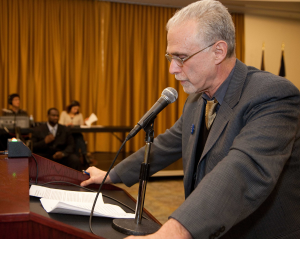When the CUNY Board of Trustees prepared to vote on an overhaul of CUNY’s Bylaws last June, the PSC objected to many of the changes as undermining the rights of faculty and staff.
 |
CUNY central administration claimed the changes were essentially technical in nature, designed to clean up obsolete language and unclear passages that had developed over the years. But the union warned that these were “far more than minor revisions,” and faculty and staff seemed to agree: nearly a thousand PSC members sent messages to management in a single day when the changes were announced in May.
UNION OBJECTIONS
In response, management agreed to postpone a vote on the revisions until the Fall, and in subsequent discussions with the union the administration made some significant changes to its proposals. But on several important issues, CUNY did not alter the proposed revisions, and when the trustees voted to approve the package of changes on November 28, it was over the union’s objections.
PSC officers laid out the union’s continuing concerns in testimony at the board’s public hearing on November 21. “The PSC objects to the revisions to Article 11, which diminish the integrity of the job descriptions for both faculty and staff of CUNY by eliminating most from the Bylaws,” Mike Fabricant, the union’s treasurer, told the board. Taking job descriptions out of the Bylaws makes it possible to change them with little notice, and appears intended “to limit the union’s ability to grieve violations of job descriptions,” Fabricant said.
At the same time that descriptions for existing jobs were eliminated, new jobs were introduced with no descriptions at all. “For example,” said Fabricant, “the proposed position ‘Affiliated Professional’ is a meaningless, catch-all title” with no clear purpose or duties – and this “foreshadows a disturbing lack of transparency and accountability in the structure of employment at CUNY.”
On the other hand, Fabricant said, “we appreciate that some changes have been made in response to our concerns,” which removed some provisions that could have potentially undermined faculty rights. One important example is on guidelines for retrenchment: the provisions of the PSC-CUNY collective bargaining agreement that protect members’ rights in retrenchment are defined with reference to Bylaws provisions that were being eliminated. After discussion of the union’s concerns, CUNY management agreed to remain bound by these terms.
But despite some positive changes, union leaders said that management failed to address some of the union’s main concerns. Nor had CUNY ever sought broad public discussion of the changes – most faculty and staff heard about them only from the PSC. The full text of the revisions was never posted online, and a summary of their final version was not posted until two weeks before the vote by the Board of Trustees.
‘ISOLATED’
“This wholesale rewriting of the Bylaws tarnishes the board’s historic vision, developed over decades, about how this University should operate,” said PSC First Vice President Steve London. “Transparency and employment rights have been sacrificed for a more corporate and hierarchical structure. In adopting these new Bylaws without meaningful consultation with the whole University community, the Board of Trustees stands isolated from the community it is charged to govern.”
“The CUNY administration would not have budged one inch on the Bylaws if a thousand PSC members hadn’t spoken out last spring,” said the union’s president, Barbara Bowen. “The faculty and staff response was amazing, but it shouldn’t take a thousand protest messages to produce just this partial movement. The Board holds hearings presumably to be influenced by what people have to say. I am disappointed, but not surprised, that they made no further changes in response to our November testimony.”

